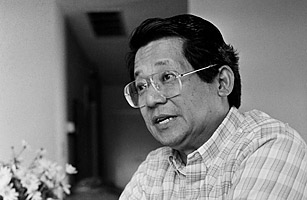
Benigno Aquino Jr. (or Ninoy, as he was known) was destined to enter politics. He was a scion of a prominent Filipino political clan and was elected his country's youngest-ever Senator at the age of 34 — a feat that would have him crowned the "Wonder Boy of Philippine Politics." On Sept. 21, 1972, when Ninoy's former fraternity brother Ferdinand Marcos declared martial law, Ninoy and other opposition leaders were jailed. After seven years of confinement, he suffered a heart attack and was allowed by Marcos to go to the U.S. for surgery. That was followed by three years of self-imposed exile, after which he returned to the Philippines, reportedly saying on the plane back, "My feeling is, we all have to die sometime, and if it's my fate to die by an assassin's bullet, so be it." As he stepped off the plane, he was gunned down, dying in a bloody pool on the Manila tarmac. News of his death sparked mass protests that eventually led to the end of Marcos' 20-year regime and the restoration of democracy to the Philippines with the election of Ninoy's wife Corazon.